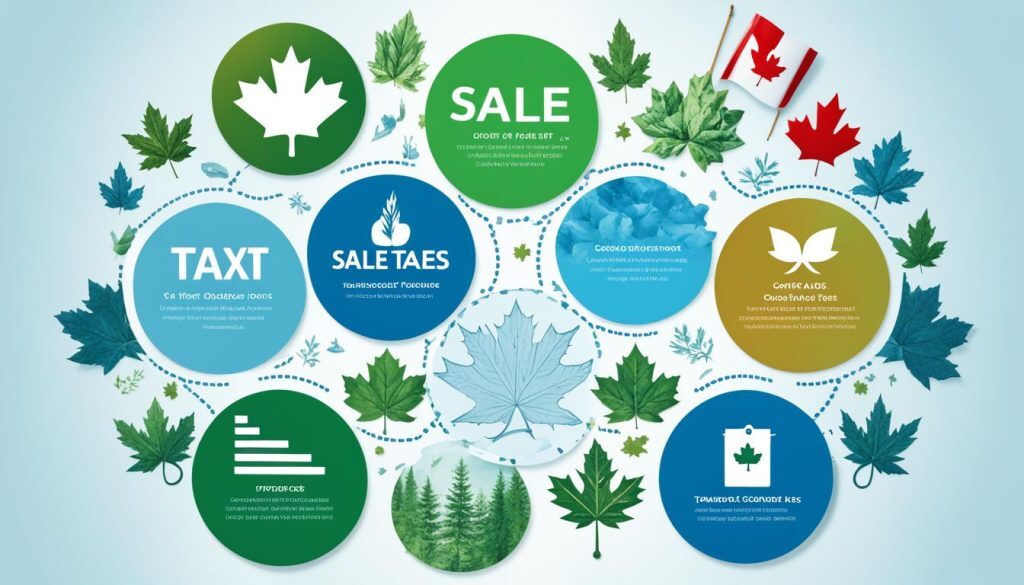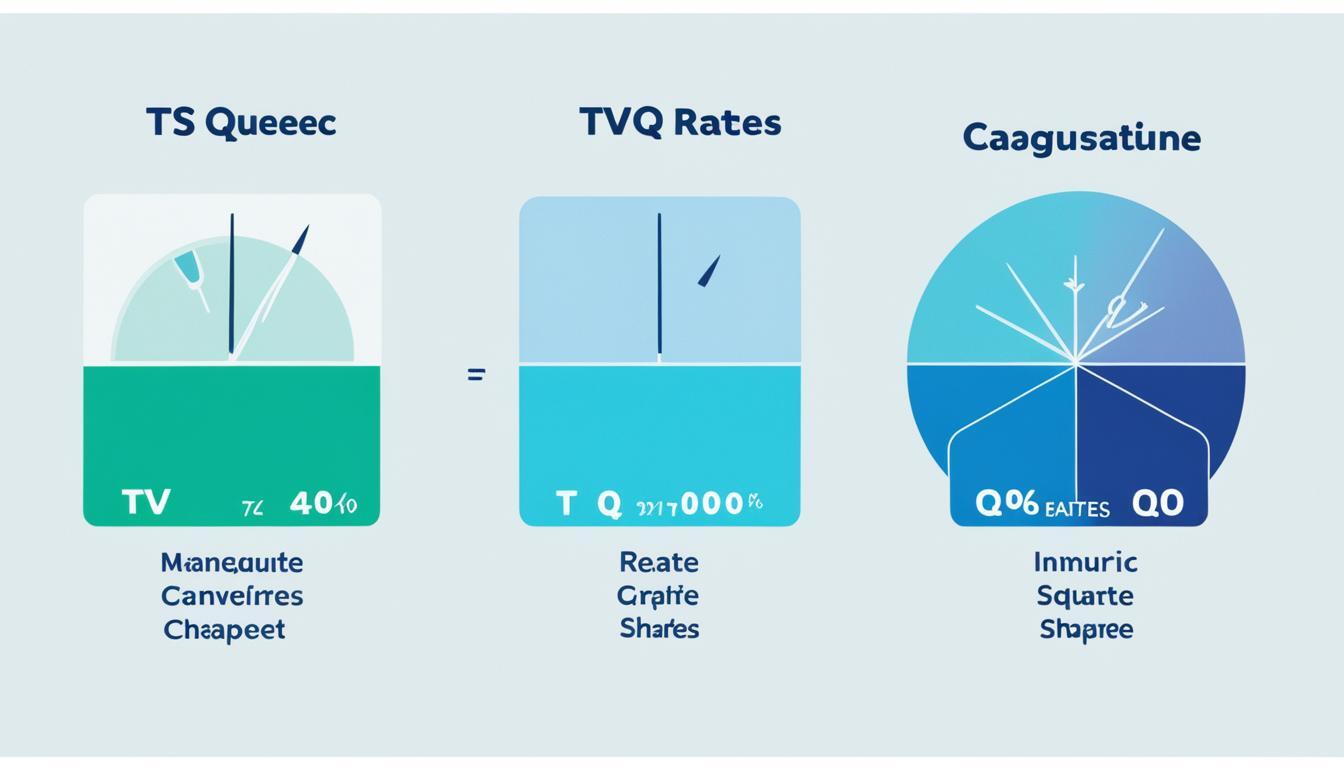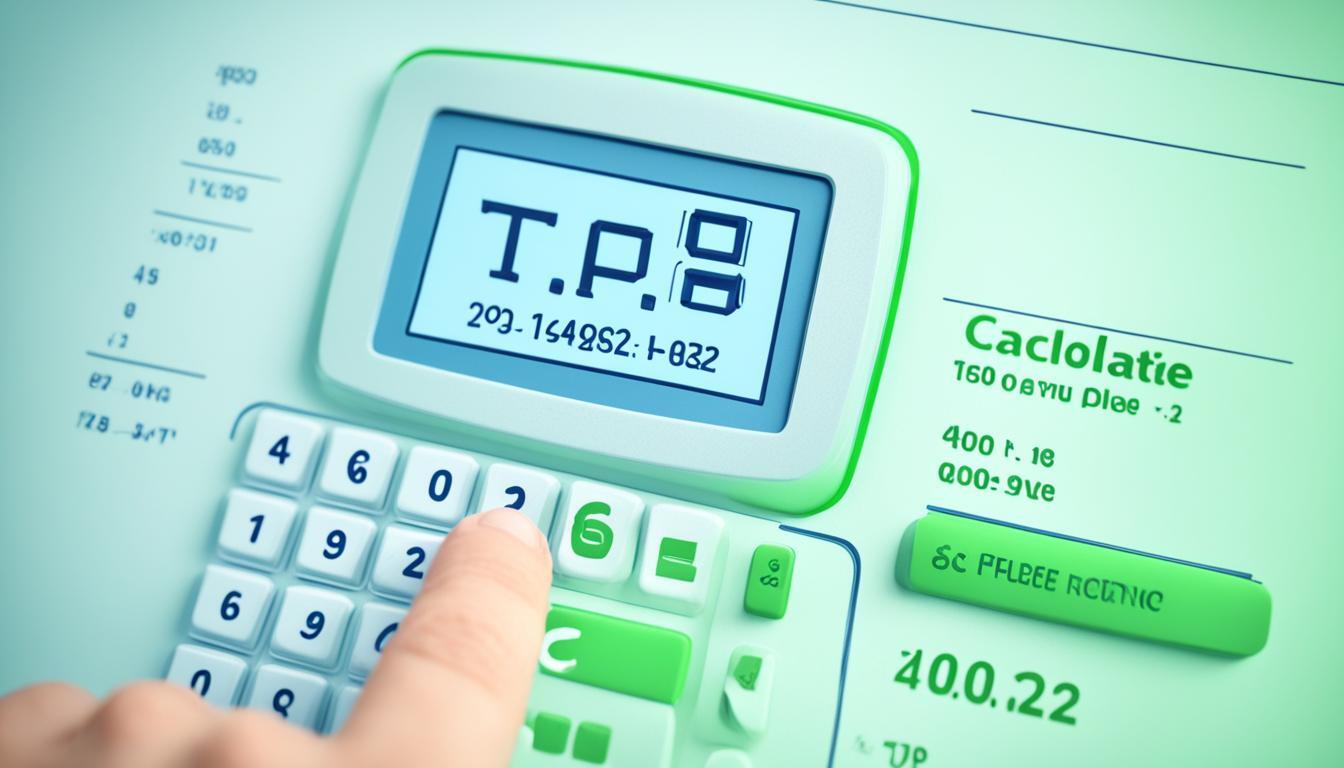Quebec TPS and TVQ Rates – Updated Guide
Did you know that the combined rate of the Goods and Services Tax (TPS) and Quebec Sales Tax (TVQ) in Quebec is a staggering 14.975%? That’s almost 15% of the purchase price added in sales taxes alone! With such high rates, it’s crucial to understand the TPS and TVQ system in Quebec to avoid any surprises at the cash register.
Key Takeaways:
- TPS and TVQ in Quebec have a combined rate of 14.975%.
- TPS is the Goods and Services Tax and has a rate of 5%.
- TVQ is the Quebec Sales Tax and has a rate of 9.975%.
- Understanding the TPS and TVQ system is crucial to avoid surprises at the cash register.
- Knowing the exemptions and rebates available can help minimize the impact of sales taxes.
Overview of Sales Tax in Canada
In Canada, there are three types of sales taxes that vary by province and territory – PST (Provincial Sales Tax), GST (Goods and Services Tax), and HST (Harmonized Sales Tax). Let’s take a closer look at each type:
Provincial Sales Tax (PST)
PST is a provincial tax imposed by certain provinces and territories in Canada. It is separate from the GST and is levied on the retail price of taxable goods and services. Currently, not all provinces charge PST, as some have chosen to harmonize their tax systems with the GST to create the HST. The rates for PST vary by province and can range from 0% to 10%.
Goods and Services Tax (GST)
The GST is a federal tax collected by the Government of Canada and is applied to the majority of goods and services sold in Canada. The GST rate is 5%, and it is the same rate across all provinces and territories, except for those that have harmonized their tax systems with the GST to create the HST.
Harmonized Sales Tax (HST)
The HST is a combined tax that integrates the GST and the PST into a single tax administered by the federal government. Not all provinces and territories have adopted the HST, but those that have implemented it combine the GST and PST rates into one harmonized rate. The HST rates vary by province and can range from 13% to 15%.
Here is an overview of the sales tax rates in some key provinces and territories in Canada:
| Province/Territory | HST Rate | PST Rate | GST Rate | Combined Rate |
|---|---|---|---|---|
| Alberta | N/A | 0% | 5% | 5% |
| British Columbia | 7% | 7% | N/A | 14% |
| Manitoba | 7% | 7% | N/A | 14% |

Exemptions and Rebates to the QST
In Quebec, there are several exemptions and rebates available for the Quebec Sales Tax (QST). These exemptions and rebates provide certain individuals and businesses relief from paying the full QST amount. Understanding these exemptions and rebates can help you save on your taxable purchases.
QST Exemptions
Quebec offers a range of QST exemptions to certain goods and services. Some notable exemptions include:
- Books with an ISBN: Purchases of books with an International Standard Book Number (ISBN) are exempt from QST.
- Products for infants: Items such as diapers, baby food, and children’s clothing are exempt from QST.
- Certain insurance premiums: There is a special 9% rate of QST on insurance premiums related to specific entities or properties.
These exemptions are designed to reduce the tax burden on essential goods and services, making them more affordable for individuals and families.
QST Rebates
In addition to exemptions, Quebec also offers QST rebates in specific situations. These rebates allow eligible individuals and businesses to recover a portion of the QST paid on certain purchases.
QST on Insurance Premiums
When it comes to insurance premiums, Quebec imposes a QST rate of 9% on premiums related to specific entities or properties. It’s important to factor in this tax when budgeting for insurance expenses.
QST on Used Motor Vehicle Sales
When purchasing a used motor vehicle in Quebec, the treatment of QST depends on whether you buy from a dealer or an individual.
- If you buy a used motor vehicle from a dealer, you will be required to pay both the Goods and Services Tax (GST) and the QST.
- However, if you purchase a used motor vehicle from an individual, you will only have to pay QST on the greater of the sales price or estimated value, as per Quebec’s tax regulations.
It’s important to be aware of these QST considerations when buying or selling a used motor vehicle in Quebec.

GST/HST Exemptions and Rebates
When it comes to sales taxes in Canada, there are certain goods and services that are exempt from the Goods and Services Tax (GST). These exemptions are beneficial for consumers and provide relief from the additional costs associated with sales taxes. Here are some of the key exemptions to be aware of:
- Basic Groceries: Essential food items such as fresh fruits, vegetables, meat, fish, dairy products, and bread are exempt from GST. This exemption ensures that Canadians have access to affordable and nutritious food.
- Prescription Drugs: Medications that require a prescription are also exempt from GST. This exemption helps to make healthcare more affordable for individuals who rely on prescription drugs for their well-being.
- Medical Devices: Certain medical devices, such as hearing aids, prosthetic limbs, and wheelchairs, are exempt from GST. This exemption recognizes the importance of these devices in improving the quality of life for individuals with medical conditions.
- Feminine Hygiene Products: Items such as tampons, pads, and menstrual cups are exempt from GST. This exemption acknowledges the necessity of these products for women’s health and well-being.
In addition to these exemptions, there are also direct exemptions for specific goods and services. These exemptions apply to various sectors and play a crucial role in supporting certain industries. Here are a few examples:
- Residential Resales: When purchasing a residential property from an individual, there is no GST applicable. However, if the property is bought from a builder or developer, GST will be charged.
- Rental Accommodations: The rent collected for residential rental accommodations is exempt from GST. This exemption contributes to affordable housing options for Canadians.
- Educational Services: Educational services provided by qualified institutions, such as schools and universities, are exempt from GST. This exemption supports access to education and helps to alleviate the financial burden on students.
- Medical and Dental Services: Services provided by medical professionals, including doctors, dentists, and chiropractors, are exempt from GST. This exemption ensures that healthcare remains accessible to all Canadians.
It’s important to note that while these exemptions provide relief from GST, it’s still necessary to pay attention to other applicable taxes, such as the Provincial Sales Tax (PST) or the Harmonized Sales Tax (HST), depending on the province or territory.
Furthermore, the government provides a program called the GST/HST Credit, which is a quarterly payment given to low and moderate-income individuals to offset the sales taxes they pay. This credit is designed to provide financial assistance to those who may be burdened by the cost of GST and HST. It’s based on individual income and family size, and the amount received can vary. To determine eligibility and apply for the GST/HST Credit, individuals should visit the Canada Revenue Agency (CRA) website.
| Goods and Services | Eligibility for GST Exemption |
|---|---|
| Basic Groceries | Exempt |
| Prescription Drugs | Exempt |
| Medical Devices | Exempt |
| Feminine Hygiene Products | Exempt |
| Residential Resales | Exempt (when purchased from an individual) |
| Rental Accommodations | Exempt |
| Educational Services | Exempt |
| Medical and Dental Services | Exempt |
Sales Tax Revenue in Quebec and Canada
Sales taxes play a vital role in both Quebec and Canada’s fiscal landscape, contributing significantly to government revenues. In Quebec, sales tax revenue is a crucial source of income, with total sales tax revenues for the 2019 fiscal year estimated to reach $22.118 billion.
This represents a substantial portion of Quebec’s overall revenue, accounting for approximately 23.8% of the province’s total income, excluding federal transfers.
On the federal level, the Goods and Services Tax (GST) is projected to generate significant tax revenue amounting to $40.8 billion during the same fiscal year. This revenue from the GST contributes approximately 14.2% to the total tax revenue collected by the Canadian federal government.
| Quebec | Canada (Federal) | |
|---|---|---|
| Sales Tax Revenue | $22.118 billion | $40.8 billion |
| Percentage of Total Revenue | 23.8% | 14.2% |
The substantial sales tax revenue collected in Quebec and Canada reflects the importance of these taxes in financing government programs and services. This revenue helps support various initiatives, such as healthcare, education, infrastructure development, and social welfare programs.
Registering for Sales Taxes in Quebec
As a business operating in Quebec, it is important to understand the process of registering for both the Quebec Sales Tax (QST) and the Goods and Services Tax/Harmonized Sales Tax (GST/HST). Registering for these sales taxes allows your business to collect and remit the applicable taxes, ensuring compliance with the regulations set forth by Revenu Québec.
When registering, you will need to follow specific guidelines and procedures outlined by Revenu Québec. These guidelines can be found on their official website, where you will find detailed information including the necessary forms, documents, and steps required to complete the registration process.
By registering for QST and GST/HST, you can confidently navigate the world of sales taxes in Quebec. Understanding your obligations and ensuring compliance will help you avoid penalties and maintain a good standing with Revenu Québec. Remember, as a business owner, it is your responsibility to stay informed about the rules and regulations surrounding sales taxes, and registering is the first step towards meeting your obligations.
- Canada Arrest Protocol: What Police Say Upon Arrest - June 12, 2025
- Can Police Disclose Who Reported You? Find Out Here - June 6, 2025
- 2025 Window Rebates Ontario: How to Save Money While Replacing Windows and Doors - April 24, 2025




















Post Comment